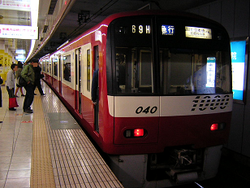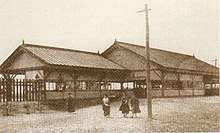Keikyū Airport Line
The Keikyu Airport Line (京急空港線, Keikyū Kūkō-sen) is a 6.5 km (4.0 mi) commuter line operated in Japan by the private railway operator Keikyu. It connects Keikyu Kamata with Haneda Airport Terminal 1·2 (at Tokyo International Airport) in Tokyo, and has Airport Express (エアポート急行), Limited Express (特急, 快特) and Airport Limited Express (エアポート快特) services, virtually all of which continue along the Keikyu Main Line either north to Shinagawa Station in central Tokyo with some trains continuing onto the Toei Asakusa Line, or south to Yokohama Station and onward towards Shinzushi Station.
| Keikyu Airport Line | |
|---|---|
| KK | |
 Keikyu 1040 EMU at Haneda Airport station | |
| Overview | |
| Native name | 京急空港線 |
| Type | Commuter rail |
| Locale | Tokyo |
| Termini | Keikyū Kamata Haneda Airport Terminal 1·2 |
| Stations | 7 |
| Operation | |
| Opened | 1902 |
| Owner | Keikyu |
| Technical | |
| Line length | 6.5 km (4.0 mi) |
| Number of tracks | 2 |
| Track gauge | 1,435 mm (4 ft 8 1⁄2 in) |
| Electrification | 1,500 V DC, overhead catenary |
| Operating speed | 110 km/h (70 mph) |
There is a switchback at Keikyū Kamata for direct train services between Yokohama Station and Haneda Airport.
Service types
Keikyu operates the following different types of service, including all-stations "Local" trains.
Abbreviations:
- Lo = Local (普通, Futsū): Stops at all stations
- AE = Airport Express (エアポート急行, Eapōto Kyūkō)
- LE = Limited Express (特急, Tokkyū)
- LE = Limited Express (快特, Kaitoku)
- A = Airport Limited Express (エアポート快特, Eapōto Kaitoku)
Station list
| No. | Name | Japanese | Distance (km) | Lo | AE | LE | LE | A | Transfers | Notes | Location |
|---|---|---|---|---|---|---|---|---|---|---|---|
| KK11 | Keikyū Kamata | 京急蒲田 | 0.0 | ● | ● | ● | ● | | | KK Keikyu Main Line (through service) | Ota, Tokyo | |
| KK12 | Kōjiya | 糀谷 | 0.9 | ● | ● | ● | | | | | |||
| KK13 | Ōtorii | 大鳥居 | 1.9 | ● | ● | ● | | | | | |||
| KK14 | Anamori-inari | 穴守稲荷 | 2.6 | ● | ● | ● | | | | | |||
| KK15 | Tenkūbashi | 天空橋 | 3.3 | ● | ● | ● | | | | | MO Tokyo Monorail (MO07) | ||
| KK16 | Haneda Airport Terminal 3 | 羽田空港第3ターミナル | 4.5 | ● | ● | ● | ● | ● | MO Tokyo Monorail (MO08) | ||
| KK17 | Haneda Airport Terminal 1·2 | 羽田空港第1・第2ターミナル | 6.5 | ● | ● | ● | ● | ● | MO Tokyo Monorail (Terminal 1: MO10, Terminal 2: MO11) |
History

On 28 June 1902, the Keihin Railway opened the 1,435 mm (4 ft 8 1⁄2 in) gauge Anamori Line from Kamata to Anamori Station (穴守駅) (close to the present-day Tenkūbashi Station), electrified at 600 V DC.[1] In 1904, the line was regauged to 1,372 mm (4 ft 6 in) in conjunction with the regauging of the Keikyu Main Line. The entire line was double-tracked in 1910.[1]
The line was built to transport the visitors of Anamori Inari Shrine which was located in front of Anamori Station. Keihin Railway built a baseball park, tennis court, swimming pool, amusement park nearby to help increase the users of the line. In 1931, Haneda Airport opened 500 m (1,600 ft) north of Anamori Station.
The line was the primary rail route to Haneda Airport(via Anamori Station) until 1945, when the airport was taken over by the United States Armed Forces. The line was converted back to single track in order to make way for a parallel freight line. Service to the airport island resumed on 20 April 1956 when the line was extended to a new Haneda Airport Station (present-day Tenkūbashi Station), and from 1 November 1963 the line was renamed the Airport Line.[1] It was not commonly used to access the airport for many years, as frequencies were limited and no through services to central Tokyo were offered, in comparison to the Tokyo Monorail which provided direct service from Hamamatsucho to the airport terminal beginning in 1964.
Haneda Airport was significantly expanded with a new terminal in 1993, and Keikyu received government permission to serve the new terminal as the monorail alone was deemed to have inadequate capacity. From 18 November 1998, the Airport Line was extended from Tenkūbashi to Haneda Airport Station (present-day Haneda Airport Domestic Terminal Station), allowing direct service between the airport and major stations such as Shinagawa and Yokohama.[1] Haneda Airport International Terminal Station opened on 21 October 2010.[1]
Keikyu teamed up with Sega to decorate a special limited edition "Sonic the Hedgehog/Puyo Puyo" train which ran on the Keikyu Airport line from 14 November 2016 to 17 December 2016 to celebrate the 25th anniversary for both games. The train was part of the Keikyu 2100 series' "Keikyu Blue Sky Train" livery and featured images of Sonic, Tails, Knuckles, Amy, Shadow, Silver, Eggman and Carbuncle as well as a collection of the game’s expressive stacking blobs. In addition, signs at the Airport Line’s Otorii Station, the closest stop to the site of Sega’s original office prior to 2018, were featuring special images honoring the games.
See also
References
- Terada, Hirokazu (19 January 2013). データブック日本の私鉄 [Databook: Japan's Private Railways]. Japan: Neko Publishing. p. 232. ISBN 978-4-7770-1336-4.